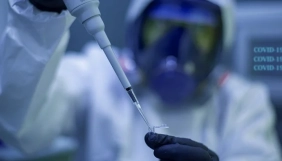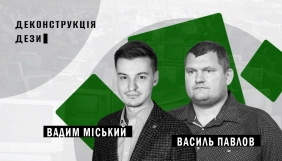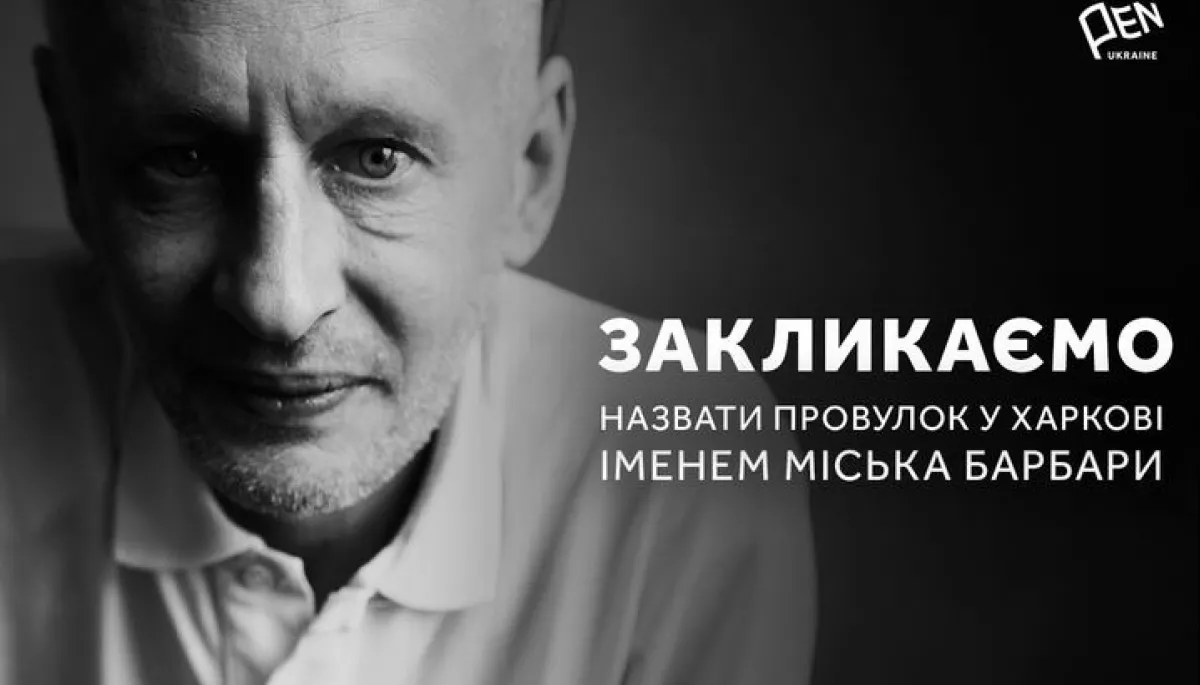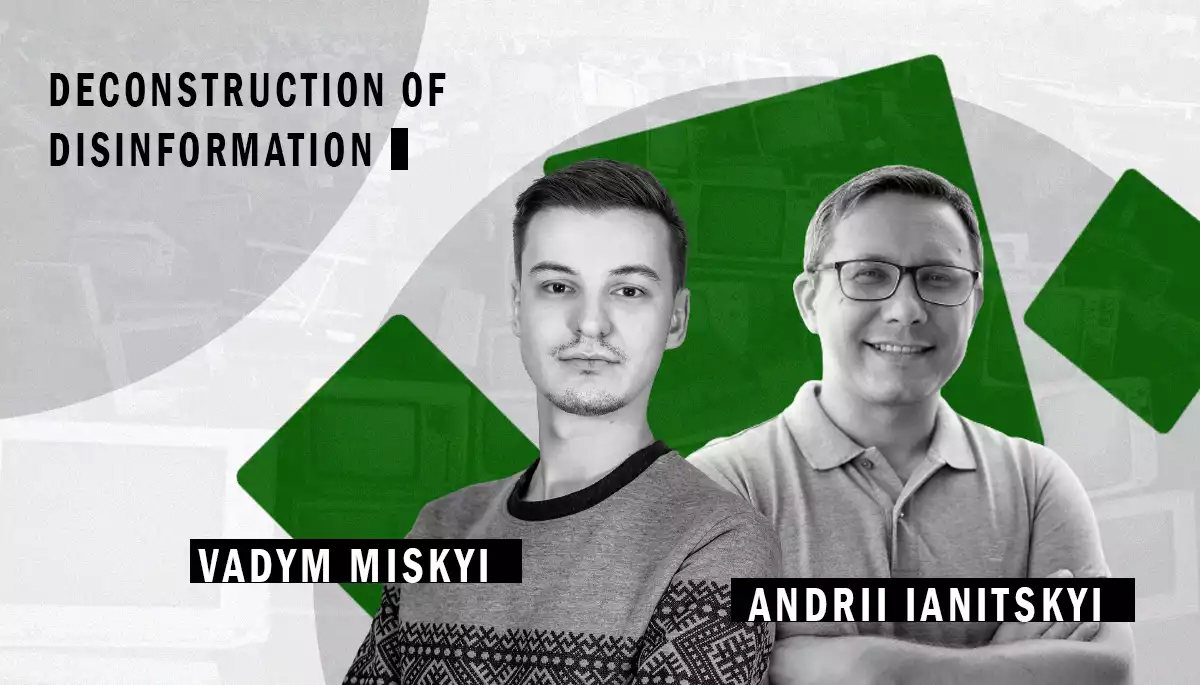
Andriy Yanitskyi: "Only Russian propagandists can say that Ukraine's economy is completely destroyed"
Andriy Yanitskyi: "Only Russian propagandists can say that Ukraine's economy is completely destroyed"
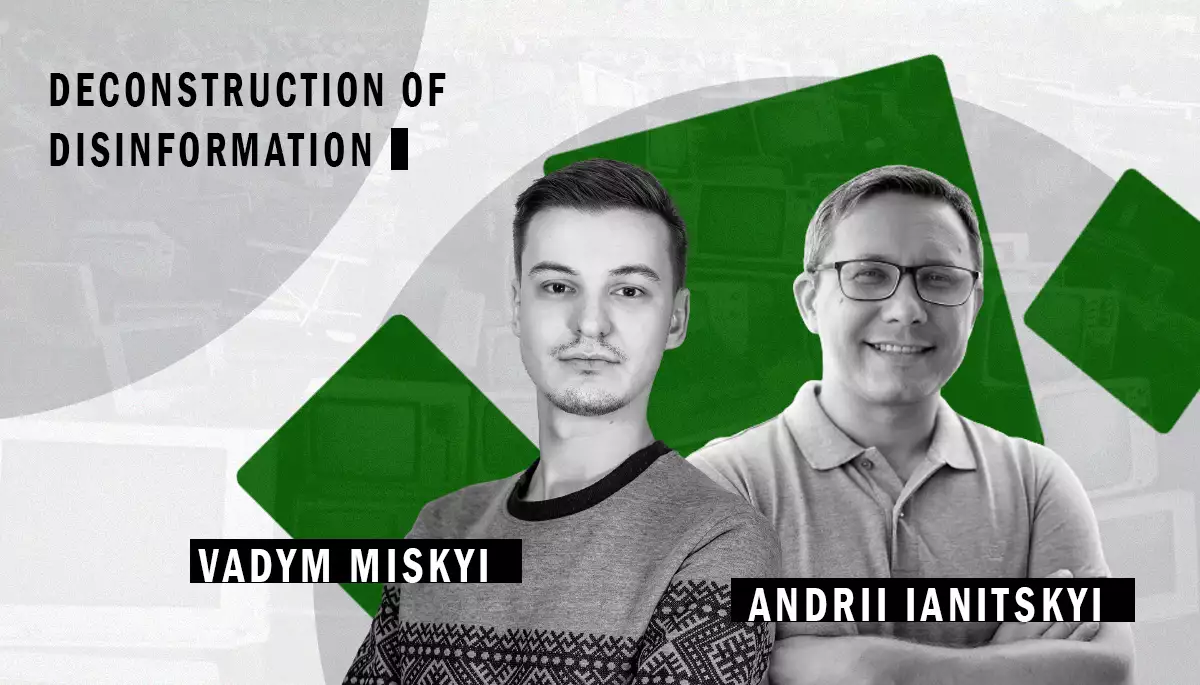

Українською інтерв'ю читайте тут.
As part of the program "Anatomy of a fake", which is broadcast on the international Russian-language TV channel "Novyi Mir", as well as the podcast "Russian fake, go f*** yourself", which is broadcast on "Ukrainian Radio", Vadym Miskyi talks with media experts about the essence of disinformation and ways to fight against it.
— Andriy, let's start with sanctions against Russia. On the one hand, we all understand that the sanctions are unprecedented. At the same time, Russia repeats that it has been almost unaffected by them. Supposedly, these sanctions hit the states that introduced them more harshly than those hit Russia itself, and they try to prove it with twisted excerpts from the publications of Western publications. Does Russia suffer from sanctions? Are they effective?
— Sanctions affect and hurt Russia very much. Russian propaganda tries to keep it quiet, but the regional press frankly writes about the worsening lives of ordinary Russians. The Ukrainian project "Nashi Hroshi", which until February 24th, has been writing about procurement corruption, is now monitoring publications in Russian regional media and reports on the impact of sanctions on Russians. "In Yekaterinburg, the price of the Internet has risen sharply: +20% of the price", "In the Ryazan region, due to the increase in the cost of materials, local authorities could not repair the hospital", "In Rostov, six cinemas have closed", "In Kazan, due to the outflow of Western business, 2/3 of the advertising spaces are empty", and so on. That is, not only do the sanctions themselves affect the situation but also the decision of foreign businesses to leave Russia. We laughed a lot at their attempt to replace McDonald's with "Vkusno i tochka"...
- They can't even supply French fries themselves, and what they got was not even a McDonald's.
- Yes, there have not been enough ordinary potatoes. Then they had to immediately start selling beer there because restaurants could not be profitable without it. But that didn't help either.
Sanctions also hit the automobile industry — Russia cannot produce modern cars without Western technologies. For example, they launched a special automobile model, "Niva Legend," which comes without airbags and automatic transmission because they cannot produce such things.
Cinemas are closing because all Western film producers are banning rental. First, "Brat" and "Brat-2" were presented in the cinemas, and then the repertoire ended. Now they have to go back to the "pirated" video stores era. It is also called now the "creative meetings" and not movie screenings, for example. Moreover, cinemas are being remodeled in some regions, and some halls are being closed.
— What about the exchange rate? The ruble has strengthened...
— Yes, the ruble has strengthened because the Central Bank of Russia acts professionally. But this was achieved through bans and strict regulation. The ruble rate against the dollar has increased, but it is quite tricky to buy dollars with rubles. More than four hundred thousand Russians left the country for political reasons - they did not want to live under a fascist regime. They tried to buy currency, and it was far from always successful. Mastercard and Visa payment cards do not work in the country. A Russian payment system called "Mir" does not work outside of Russia.
In addition, Russia is cut off from the rest of the world. Russians cannot travel to many developed countries because they need a visa. Those who emigrate go mainly to Georgia, Armenia, and Turkey. Georgian friends complain that there are now more Russians than Georgians in Tbilisi.
— We know that the Russian economy depends on the export of raw materials, primarily energy. Before the great war in Ukraine started, oil and gas provided Russia with 60% of foreign exchange earnings. We understand that Europe cannot give up Russian oil and gas simultaneously. The oil embargo is being introduced in stages and is stretched over time. Germany even helped Russia repair the Nord Stream gas pipeline, but it still cut supplies. Why does the Kremlin need it?
— First of all, one needs to understand the importance of gas and Gazprom for Russia - there is an excellent book about this from 2008, "Gazprom: the new Russian weapon", written by Valeryi Panyushkin and Mykhail Zyhar. The story tells how Putin, with the help of Gazprom, actually took over Russia. By controlling Gazprom, he first gained control over the television, including private TV channels; and then began to use it as a foreign policy tool. We remember the Russian-Ukrainian "gas wars" and know how much was done to make Ukraine dependent on Russian gas. When Yanukovych became president, we owed so much for gas that he was forced to go for the "Kharkiv agreements".
Today Russia is doing with Europe the exact same that it has always tried to do with Ukraine. The weak point here is Germany, which during Angela Merkel's time became heavily dependent on Russian gas and now cannot give it up. They cannot impose a gas embargo and switch to other energy sources. For example, the Germans, for some reason, have a terrible attitude towards atomic energy; I suspect that there were also Russians who sponsored "green" environmental movements in Germany.
Europeans are now trying to reduce gas consumption by 15% in the winter season. Each country will do it in its own way. But there is no discussion about a complete rejection of Russian gas. European states considered the idea of imposing a tax on Russian gas that would go to support Ukraine. Or buy more gas in other countries. The problem is that gas pipelines from other countries, like those from Russia, are not linked to Europe. Liquefied gas is transported by sea from America, which is also not very profitable.
Is Russia hurting itself by cutting supplies? In fact, not very much, as because of this, gas prices are rising, and Russia will receive more money for smaller gas volumes. Therefore, it is precisely here that half-hearted solutions do not work. If Europe stops at that slight reduction in the consumption of Russian gas and does not eventually reach a total embargo, Russia will lose only a little.
— In addition to the damage that Europe allegedly inflicts on itself with sanctions, Russian propagandists manipulate on the amount of support that Western countries provide to Ukraine and Ukrainian refugees. June headline publication says that "Germany transfers billions of euros to Ukraine, while German pensioners are starving". Russia promotes similar narratives in many countries. Are Western countries really spending so much by supporting Ukraine, and because of it their citizens level of life is deteriorating?
- What is considered a deterioration? Refusal to turn on air conditioners when it is +25 in the apartment? No, German pensioners are not starving. They live very well. The social support system in Germany works like clockwork. And they do not support our refugees from their own budget — the European Union gives money to support Ukrainians. It is easier for the Union to do this because it prints these euros. The EU printed euros to help businesses and European citizens when the COVID-19 restrictions were active. In fact, the so-called quantitative easing was carried out, which meant releasing new money into the economy. This, of course, has affected the value of the euro: the currency became cheaper, and prices rose. But the tragedy did not happen. Germans say their inflation is high, but it is "high" for Germany. 7.9% per annum is the highest for Germany in half a century. But in Ukraine, it is already 20%. Each of us became 20% poorer, each German - by 8%. Is it a tragedy? I do not think so. Maybe they don't go to the restaurant one time more, and they will postpone the purchase of the car until August, though they planned to buy in July. Someone planned a vacation in the Maldives but will go to neighboring France. Do Germans themselves perceive it as a tragedy? I do not think so - many of them sincerely support Ukraine. Of course, some do not want to help other countries and do not want to hear news about the war. But let's be honest: Ukrainians didn't really care about the fate of Syrians or Afghans. Maybe Ukraine could have helped these countries more? Now we feel it ourselves.
— Another topic is bordering the Ukrainian and world economy issues: the export of our grain. For example, the fake news headline sounds like this: "Great Britain and Turkey plan to buy out Ukrainian grain and doom Ukraine to starvation." Can we sell this grain, or do we need it ourselves?
— We produce much more grain than we need. Ukraine consumes seven and a half million tons of grain. We exported more than 50 million tons of grain last year. Mainly private companies earn from the export of grain, but they pay taxes to the budget, create jobs, and buy fuel and consumables, which means that the money they earn works for the economy of Ukraine. Due to export, foreign currency enters Ukraine, which balances the domestic demand. Importers have to buy the dollar, and exporters bring it. When the flow of dollars into and out of Ukraine is balanced, the economy is stable, and we do not need to borrow abroad. Then the hryvnia remains more or less at the same level.
Grain is one of the leading export products that we supply. Unfortunately, for now, we are a commodity economy; we cannot sell super-modern airplanes, missiles, and computers. There are very few high-tech goods in our exports, so grain, rolled metal, and iron ore are what save us and our economy. Now the government is in a situation where we have a lot of grain, we cannot export it, and something must be done about it. It seemed like it was agreed that with the help of Turkey, we would ship part of this grain by sea. We already export part of it by land, railway, and through the Danube ports. But this is not enough even for last year's harvest, and a new one is coming.
Fortunately, despite the war, our farmers can harvest. The other day I was on the border of the Dnipropetrovsk and Kherson regions and saw farmers working in the fields while a battle was going on in the neighboring village. Combine harvesters collect grain because this small company will go bankrupt if they don't do it. They are forced to take risks. Some farmers go to the fields in bulletproof vests.
Ukraine definitely won't become hungry. But the world may remain hungry. Our export flows were directed mainly to African and Asian countries, which need this grain - it is the basis of their nutrition. They cannot give up grain and buy cakes or pasta because it is much more expensive - they do not have the money for it. Therefore, the United Nations intervened in these negotiations to prevent famine in Africa and Asia.
Russians also cannot freely sell their grain. Even if their grain is not under sanctions, no one wants to buy it from the country that started the war; the Russians have difficulties with the ports. Besides, no one can be sure whether this grain was not stolen. One and a half million tons of grain ended up in elevators in the occupied territories. The Russians export it but try to disguise it as Russian. They load ships in Crimea or Berdyansk, go to sea, end up in a Russian port, get the fake export documents or even mix the stolen grain with the Russian one. Then they take the stolen commodity to Syria (where they ultimately control the situation) and then send it from Syria to other countries. And the grain, disguised as Russian, is shipped to Turkey. This is the reason for the recent tension in Ukrainian-Turkish relations: instead of detaining the stolen grain, Turkey let the cargo go. But even though Turkey did not buy this grain, the Ukrainian side had all the evidence that the grain was stolen.
Exporting grain has already started, and I hope a world food crisis will be avoided. Turkish warships will accompany ships with Ukrainian grain.
— What is actually happening now with the Ukrainian economy? The other day Fitch assigned the pre-default ratings to Ukraine, and Naftogaz declared its default on Eurobonds. How scary is it in the current conditions? Of course, Russian propaganda makes a big deal out of this.
— There is a war on our territory. One cannot expect that the economy during the war will grow or remain at the same level as in peacetime. More than 20% of the territory was occupied, and some of these territories provided a significant share of the gross domestic product: money into the economy. For example, Mariupol contributed 3–6% of GDP before two metallurgical plants were completely bombed. There are various forecasts for the Ukrainian economy’s decline; the last forecast I heard of was 35%. The situation is not simple - we can see it from the prices in the stores, and the fuel shortage, especially in the frontline regions. There is an issue of how we will meet and spend the winter. In addition, the Russians can hit thermal power plants with missiles so that the cities will remain without light and heat.
Ukraine has announced that it wants to restructure its loans. This is not a default. I will draw a parallel from ordinary life: you took a loan for a car, for example, from a bank. For several years, it was faithfully paid, and then you lost your job. Normal relations between the bank and the client are such that you come to the bank and ask for a credit holiday. Banks usually agree to this because it is more profitable for them to have the client return and start paying again than to squeeze out the money the client does not have. Currently, Ukraine is on some sort of credit vacation until 2024. Many states have already agreed to this.
The situation with Naftogaz is slightly different. There seems to be an internal conflict between Naftogaz and the government. Naftogaz said it had enough money to pay all its debts a few months ago. And now it says that the government forbids spending this money. The government has its own logic: we need money to buy gas to stock up for the winter. "Naftogaz" had to conduct the same negotiations with creditors about postponing payments, but it did not do so.
However, only Russian propagandists can say that Ukraine's economy has been destroyed. It is true that there are severe problems with the economy where the fighting is going on. Businesses have adapted in the free and liberated territories far from the front line. Kherson companies are moving to Lviv and Kyiv. Bombed factories near Kyiv have been restored and are already working (but without windows yet). Ukrainians do not like to sit without work. I like that Ukrainians do not rely on state support but take matters into their own hands and build their own destiny. This makes the Ukrainian economy very stable. I urge everyone to buy Ukrainian, go to Ukrainian restaurants, and spend money because it will support jobs and taxes.
— And yet, the Ukrainian debt continues to accumulate during the war. One of the common messages of Russian propaganda is that Ukraine will fall into debt because of the American Lend-Lease program or various loans from Western countries. Russian propagandists also say that our children, grandchildren, and great-grandchildren will pay for Zelenskyi's debts. What is the current situation with our loans? What's next?
— Debts will grow. There is nothing surprising here. But creditors also understand that Ukraine should be able to return them one day. Therefore, part of the money comes to us through grants, which do not need to be returned. Some part is given to us on special terms, and we do not have to repay every cent of it. Lend-Lease does not require a full refund immediately. Sometime soon, Ukraine will ask the International Monetary Fund for a significant amount - twenty billion dollars. Will we be able to return it? The IMF does not give such an amount of money for nothing; it demands reforms in the state. It must be sure that this money will not be stolen. Therefore, it is essential for them to that the anti-corruption system works. In addition, this money must be spent effectively, which is why, under Poroshenko and Zelenskyi, the economic bloc in the government, as well as the National Bank, was headed by people who had/have the trust of our international creditors, in particular, the IMF. In short, Ukraine's debt policy is reasonable, and no one will get into debt. We even have a confrontation between the National Bank and the Ministry of Finance regarding bonds. The Ministry of Finance is very conservative and is very slow in raising interest rates on debt securities to pay less to creditors. Meanwhile, the National Bank does not want to print money because turning on the printing press will lead to hyperinflation. They have already printed a lot - more than two hundred billion hryvnias.
Of course, we are not talking about banknotes; the National Bank buys debt securities issued by the Ministry of Finance at low-interest rates. This was necessary for the first months of a full-scale invasion because no one was prepared for such a considerable monthly expense. Now we spend a third of our budget during each month of the war. This money is used for decent salaries for the military, equipment, fuel, and clothing. However, now we have to move away from printing money, and everyone understands that. There is a gradual change in the sources of the budget's income as we try to reduce the debt burden through negotiations with creditors. I don't see a tragedy here. We have professionals in the Ministry of Finance, the National Bank, and the Ministry of Economy. I think everything will be fine, and we will be able to get out of this situation. Besides, the whole world is supporting us.




